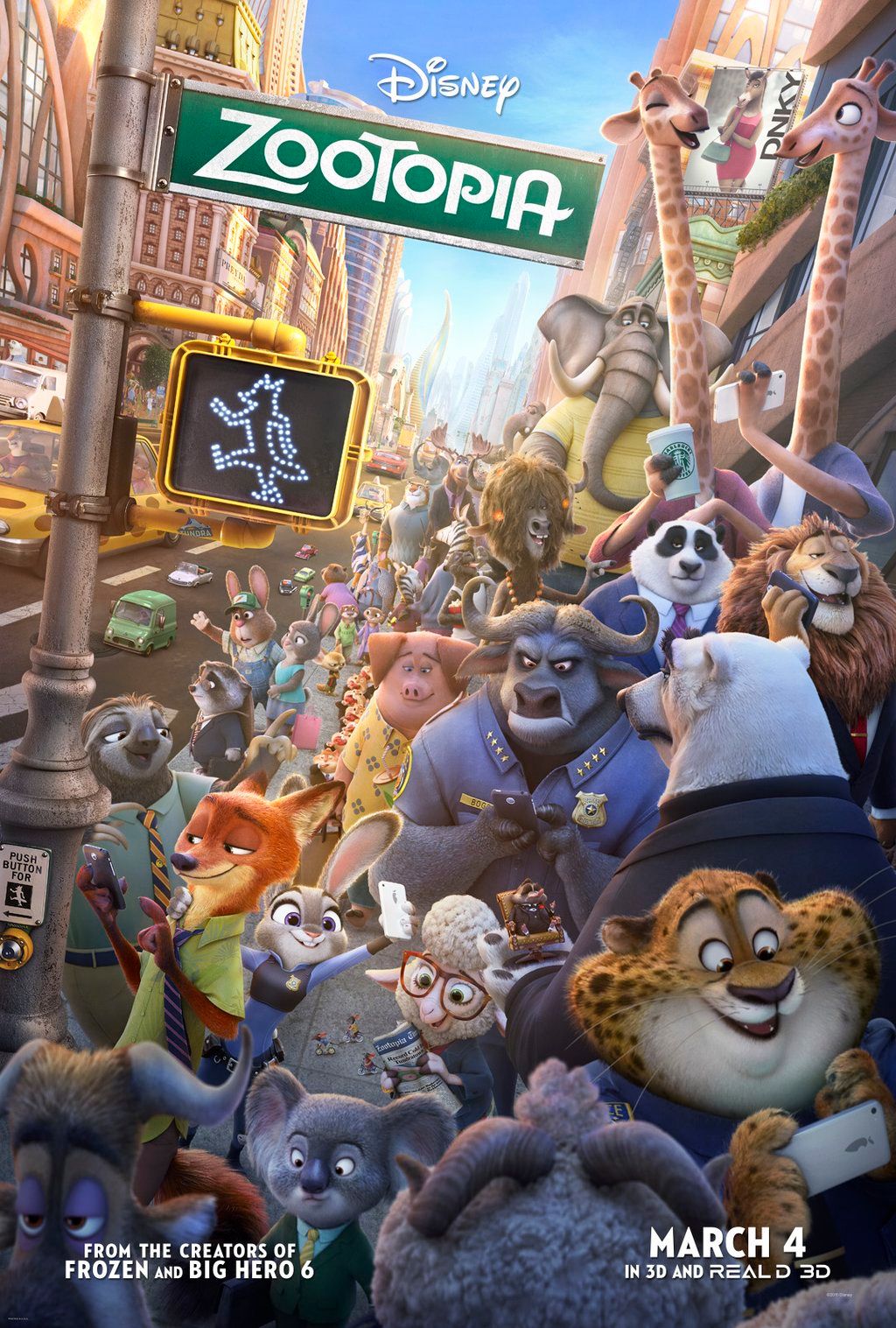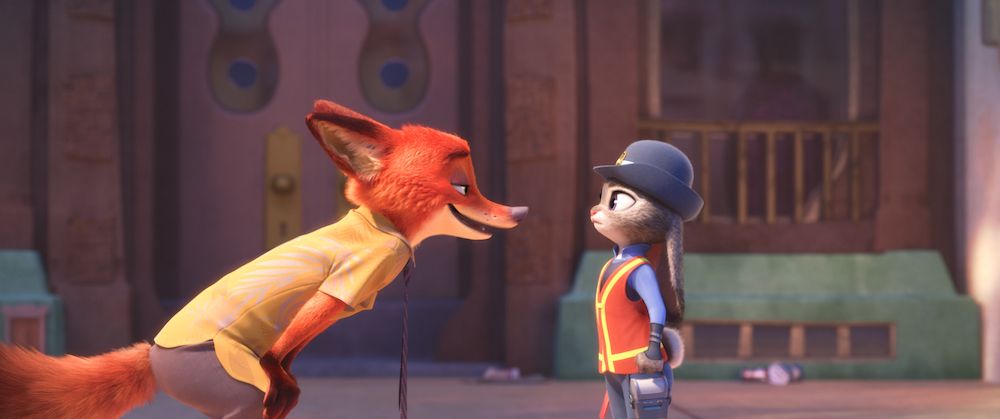The senior architects who orchestrated Disney's expansive, elaborately detailed world of "Zootopia," co-directors Rich Moore and Byron Howard admit that they'd love to continue to explore its many corners.
Mixing traditional elements of the film noir and buddy-cop genre into a 3D animated tale about bias and perception set in a sharply defined world populated by anthropomorphically evolved animals, the highly original film was embraced by moviegoers upon its release in February. Since then, it has become the fourth highest-grossing animated film of all-time in the U.S. to date, with equally staggering box office takes still accumulating around the world.
With the film making its home video debut on June 7, Moore and Howard joined SPINOFF ONLINE to consider exactly how the story of an unlikely bunny cop and her even more unexpected con artist fox partner won over audiences. The pair also explain exactly why the idea of setting further tales within the exquisitely conceived and rendered landscape of Zootopia is almost impossible to resist.
Spinoff Online: How gratified were you to see the response this film got once audiences got a chance to take it in?
Byron Howard: It was pretty unreal.
Rich Moore: It's pretty nice.
Howard: I think we hoped, because we all loved the movie and we loved what it was saying. We love that it was a smart film. I think you always hope that things will do well. This is the first time, for me, that I've seen anything I've worked on do that much business.
That fact comes to us in the box office, but I think we always think of it as like, "That's a lot of people that have seen the film!" And people who have actually talked to us on Twitter and said, "I've seen it multiple times, like three, four, five, ten times." That's a great feeling, too.
We were talking about this earlier -- we remember when we were seeing "Star Wars" over and over and over again. I saw "Empire," like, 30 times. I just couldn't get enough of that experience. To know that we were part of something that has created a similar feeling with an audience, that's terrific. That's really very humbling and enriching.
Did the project feel risky at any point?
Moore: Well, I think there were times where it felt like -- this does feel like kind of un-treaded terrain, to go into something talking about prejudice and bias. Is this going to ruffle feathers? Are we going to get a bad response from this? That just made us try to kind of present it in a way that didn't feel message-y, that didn't feel like preachy, that didn't feel like, "I've got this agenda that I want to push."
We really tried to tell the story from the main character's, from Judy's point of view. This is an experience that she was having. This is how she kind of made it through it, and this was what she kind of came away feeling. The more we kind of kept it in there and made it about the character and not about an intellectual kind of an idea or topic that we were trying to kind of experiment with, the better we felt about it.
Howard: I would say it was an education. It was an education for us as well, and everyone on the crew, as far as what bias is in the world. I think speaking for myself, I started with a much more simplistic idea of what bias and prejudice was in the world. I thought I understood it. I didn't quite understand that that's such a complex issue in our world. The fact that we are all different. The fact that we need to understand each other and appreciate each other and work together on that problem. It's not easily solved.
I love that about the movie. It doesn't paint this rosy picture at the end that says everything is peachy-keen and we can all relax. The fact that Judy has grown and figured herself out and looked within herself to understand that part of the problem is what she didn't understand, I think that was a great education for her, for all of us.
It's something that's one of the reasons I love where we work, because we dive so deeply into these subjects that we need to find out if we're making movies to say the right thing, and in doing that, we kind of grow as individuals as well. So it was a great journey for us.
Two of the things that I really loved about this film was, first, the film noir structure that is underneath everything. And then, that you weren't afraid to go to some scary places, which is part of the Disney legacy, but not every time out. So tell me about those decisions to incorporate these darker elements: a story structure that follows the noir model, but then to have some genuine scares.
Moore: We wanted to follow the conventions of a detective story. We didn't want to soften our punches or pull them. We really wanted it to emulate the conventions of a film noir. We decided early on, well, it should have some scares. It should feel, it should be kind of in the ballpark of like how "Pinocchio" felt and some of the older films, that it'll have some tense moments.
But we're conscious of the fact that it can't be like that all the time. Then it should be leavened with and tempered with humor. So we're not hitting the audience over the head with scares through the whole movie. So it was a real high-wire act of when can we really kind of bring the tension, and then how do we kind of bring the audience back down?
Especially the younger people in the audience that may not be used to a movie like this. How can we kind of make them feel like, "Okay, survived that. Everything's OK. Now, we're ramping to the next one." By the end, putting you back together again so you leave the theater feeling good, rather than like shaken up and scared about the world.
We put a lot of work into mapping the terrain of the story, and just making sure, rhythmically, that we're not losing our audience along the way because it's scary, or that it's too adult, or too silly. That's a good part of our job, just making sure that everyone in the audience is being serviced, not just one.
This has got to be one of, if not the most, fully realized universes in animated film, and even among any other kind of film, really. Now that you've constructed this kind of labyrinth-y place, do you want to explore it more? Can you imagine revisiting this territory?
Moore: It would be so fun.
Howard: It would be so cool. There's so much, and stuff we talked about that we never got to incorporate. We were saying this earlier, you get to go to Sahara Square a little bit in this movie. There's a whole dune area that we had in certain parts of the film that we cut out. Just the Rainforest District and the Sahara Square and Tundra Town are such neat areas that are worlds in themselves, where you could do a whole movie in Sahara Square.
Moore: Right.
Howard: Or a whole movie in the Rainforest District, or the Nocturnal District, which we never got to put in the film, or Outback Island, which is an Australian district. There are all sorts of other animals you've never seen that we could incorporate in the film.
It is enormous. Some films feel kind of buttoned up, like it's a little tiny story where you feel like, okay, that feels like that ties it up and I don't need to see anything else. There's so much here to tempt you to do more things.
Moore: When you asked that, it made me realize, well, with "Zootopia," we were trying to invent it and explore it at the same time. So it would be so much fun -- there are big parts of it that have been invented that now we can just kind of explore it and not have to be like, "Okay, maybe it looks like this…" It kind of exists as a place, now.
Howard: That's a good point.
Moore: We can expand on it, but now, it's kind of, it isn't the double duty of like writing the treasure map and going on the treasure map at the same time. It's like, "OK, we've got the map now. We can kind of play in the area."
Howard: It's like visiting a real city. If you go to visit New York for the first time, you kind of get, "Here's the tourist spots," you kind of see the big ticket stuff. But there's all this intricate stuff that you just don't know unless you're a local, or at least you come back over and over and over again. That's why it feels like a real place. There is so much of it that you didn't see.
"Disney's Zootopia" is available now on DVD, Blu-ray and digital download.



